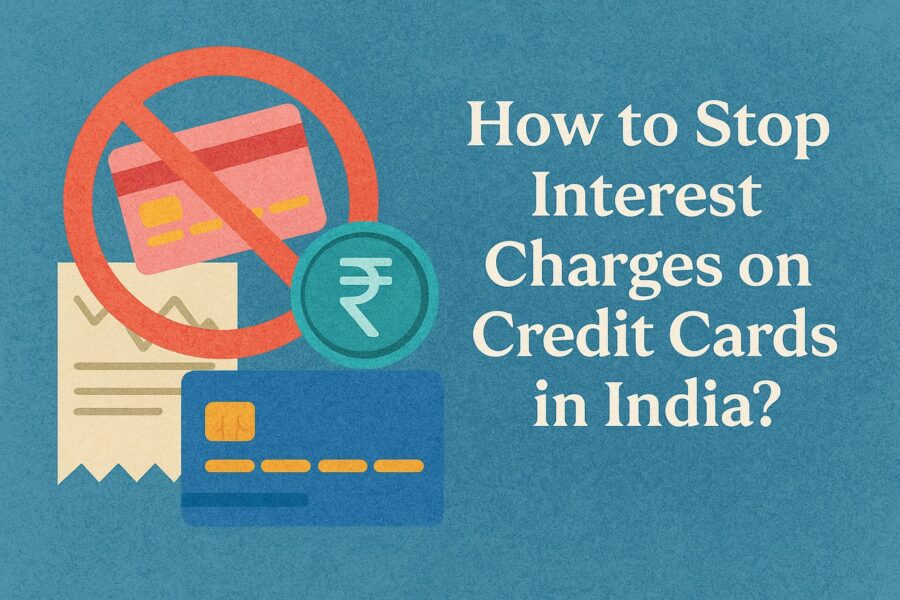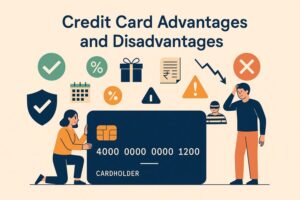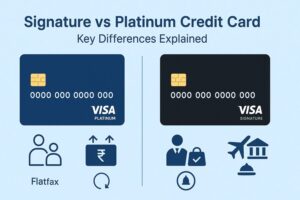A Guide on How to Stop Interest Charges on Credit Cards in 2025
- 31 Oct 25
- 6 mins

A Guide on How to Stop Interest Charges on Credit Cards in 2025
Key Takeaways
- The most effective way on how to stop interest charges on credit card is to pay your total outstanding balance within the interest-free period (up to 45 days) to avoid any interest or late payment fees.
- If you carry forward unpaid balances, avoid making new purchases. This helps you prevent compounding interest and higher debt accumulation.
- Transfer your outstanding balance to another credit card with a lower interest rate or 0% introductory offer. Always check for applicable balance transfer fees before proceeding.
- Converting high-value purchases into EMIs can reduce your effective interest rate from 44% annually to around 14–24%, easing repayment pressure.
- Cash advances and international credit card usage often attract immediate interest and conversion fees. Use a forex card or pay back withdrawals quickly to minimize charges.
Do you know that the majority of banks in India charge an interest rate of around 3.5% or above on credit cards per month? This can go up to around 44% interest rate per year. You will end up paying more if you do not know how to stop interest charges on credit cards. Let’s explore the ways to stop or reduce interest charges on credit card usage in India for effective financial planning.
How to Stop Interest Charges on Credit Cards in India?

1. Pay the Bill on Time
Credit cards in India usually come with an interest-free period of up to 45 days (approximately). The bill due date is scheduled after the interest-free period. If you pay the entire outstanding balance for a billing period within the credit card bill due date, no interest charges or late payment fee will apply.
In case you are unable to pay the entire amount, pay as much as you can or the minimum amount due. This can help you reduce the interest amount on your credit card bill. Notably, you can find the minimum amount due on your credit card statement or the credit card company's app.
In addition, you can make multiple payments before the bill due date if you cannot pay the entire amount at once. This can help you pay the entire bill within the due date, thereby avoiding interest charges.
2. Avoid Purchases on Carried Forward Balance
In case you are unable to pay the entire bill amount within the due date and you carry forward the outstanding balance, you can avoid additional purchases in the new billing cycle. Additional purchases will increase the bill amount and debt burden, attracting high interest rates.
3. Consider a Balance Transfer
If you have multiple credit cards and they levy variable interest rates, you can consider a balance transfer to the credit card that imposes a lower interest rate.
For instance, you might have an outstanding balance of ₹1 lakh on credit card A with an interest of 4% per month and you have a credit card B with an interest of 3% per month. Consider transferring the outstanding balance to credit card B to pay a lower interest amount.
You can additionally check for balance transfer introductory offers with 0% interest rates. However, if you fail to pay the outstanding balance within the offer period, higher interest rates might apply.
Notably, balance transfer on credit cards might attract a balance transfer fee. Ensure you weigh the costs before you consider a balance transfer for lower interest rates.
4. Convert to EMI
Credit card issuers often allow converting purchases into Equated Monthly Instalment (EMI). Converting your credit card transaction into EMI can help you pay a lower interest rate. For instance, an EMI conversion might lower your interest rate by approximately 14-24%.
However, you might not earn rewards on your EMI payment. Further, conversion to EMI might attract a one-time processing fee. Ensure you check the fees, terms and conditions before you consider converting your credit card transactions to EMI.
5. Avoid Withdrawing Cash with Credit Cards
Cash advances or withdrawals using a credit card attract cash advance fees. Moreover, it does not come with an interest-free period. As a result, avoiding cash withdrawals with your credit card can help you avoid the imposition of interest.
In case you withdraw money from your credit card due to a financial emergency, ensure you pay back as early as possible to reduce the interest amount.
6. Avoid Using a Credit Card Abroad
Using a credit card abroad for foreign currency transactions might attract conversion charges and additional fees for ATM withdrawals. If you are unable to pay back the high outstanding amount within the bill due date, it will attract interest rates.
Further, conversion charges might range between 3% and 5%. To avoid such charges and interest payments, you can use a forex card for foreign currency transactions instead of a credit card.
💡Pay your credit card bills in an easy and secured way and experience smooth transactions with the PICE App.
7. Consider a Personal Loan
If you have a significant amount of debt on your credit card, you can consider taking a personal loan for debt consolidation. You can pay back the credit card debt with your personal loan amount.
This can help you pay lower interest amounts as interest rates on personal loans are usually lower than credit card interest rates.
Conclusion
If you know how to stop interest charges on credit cards, you can manage your finances in a planned way. This can further help you reduce additional payments towards the interest amount. You can reduce your credit card debt burden if you can effectively manage interest payments. Ensure you keep a track of the bill due date to pay your bills within the stipulated time.



















